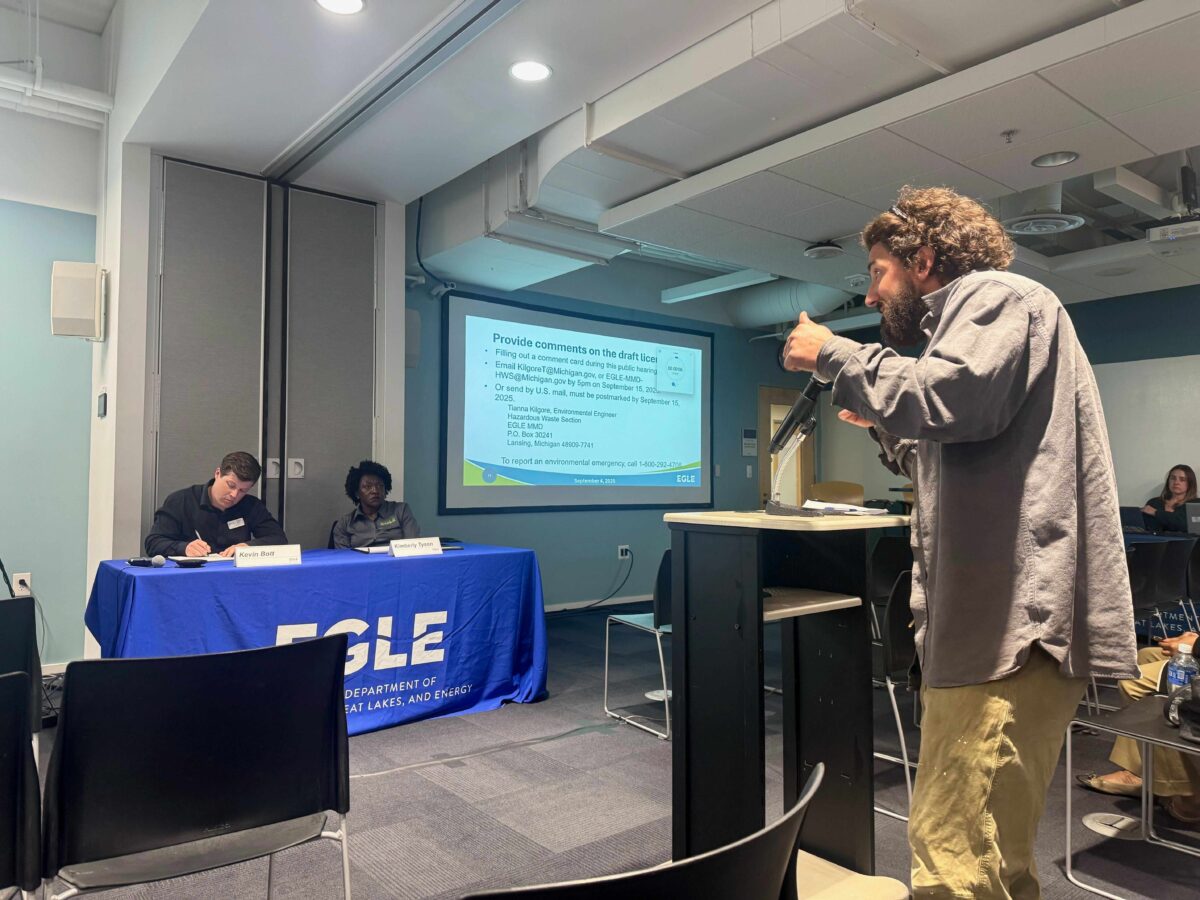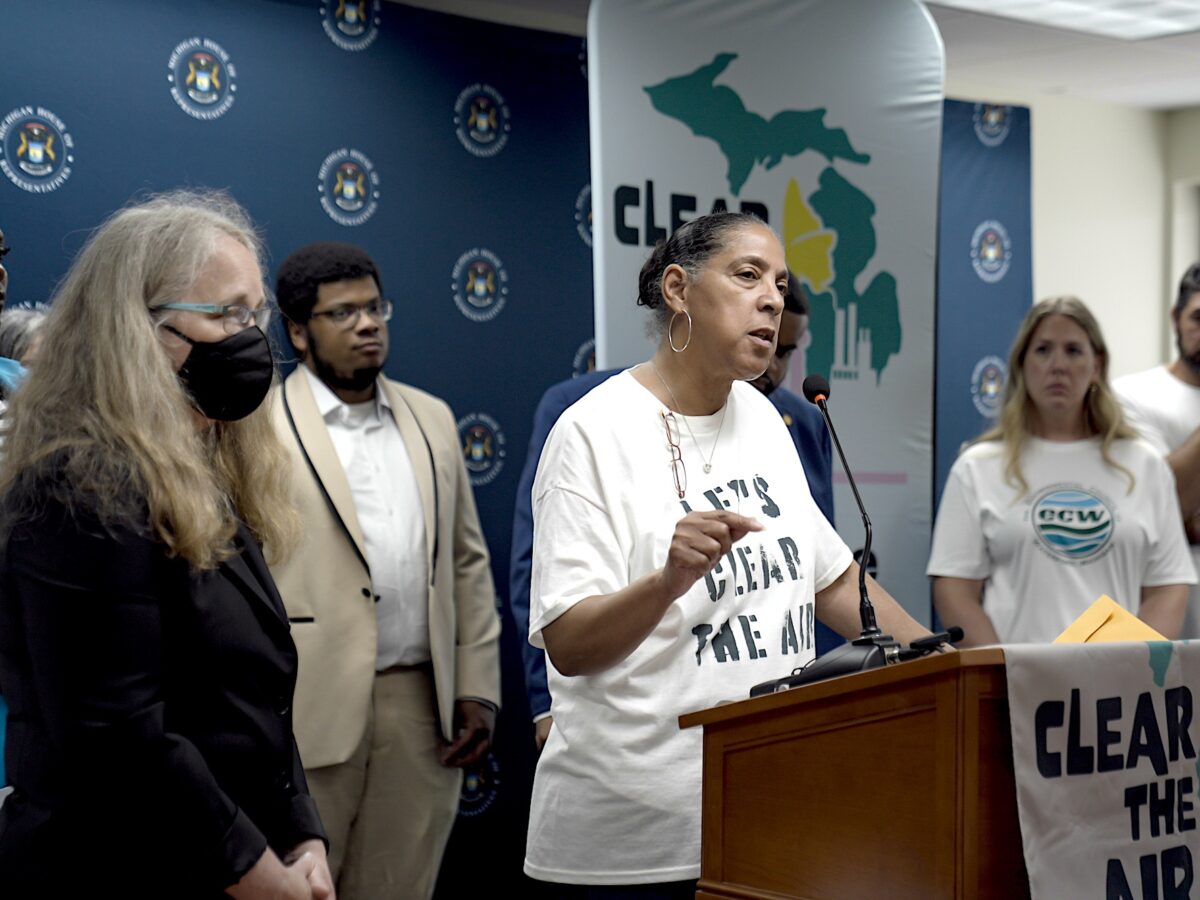Overview:
-The state is accepting public comment on US Ecology Detroit South's license renewal until Sept. 15.
-"It's hard for us to come outside when you have all these different smells and things going on, because it does affect our breathing," says lower east side resident Martha Calloway.
-The state entered a consent agreement with the hazardous waste facility in July 2024 that includes nearly $1 million in payments.
When Dave Roberts rides his bike near the US Ecology Detroit South facility, he checks the weather app on his phone when he plans his route.
“In the past, odors would be extremely noticeable,” said Roberts, who’s lived in the lower east side neighborhood surrounding the hazardous waste site for over 12 years.
At a Thursday public hearing organized by the Michigan Department of Environment, Great Lakes, and Energy, or EGLE, Roberts and other residents voiced their opposition to a pending license renewal for US Ecology Detroit South, naming the facility’s history of violations, limited community engagement, and air quality and nuisance odors as concerns.
The dozen or so attendees at Thursday’s hearing learned that EGLE issued an air quality violation notice to US Ecology the same day.
The Sept. 4 violation notice is for “persistent and objectionable odors of moderate to strong intensity” impacting residential areas downwind.
Resident on US Ecology: ‘It does affect our breathing’
Residents on the lower east side are hyperalert about the health impacts of legacy polluters, Roberts said, as they’re encircled by freeways and industrial sites like US Ecology and the now-demolished incinerator.
Located southeast of the interchange of I-75 and I-94, the hazardous waste site is a fixture in the neighborhood for four decades, and home to various industrial and commercial facilities for over a century.
Under US Ecology’s ownership in the last decade, the facility has been used to store roughly 1.2 million gallons of waste in containers and tanks for up to a year, and treat 1.8 million gallons per day, according to EGLE.
If renewed, the license would go into effect this year and last for a decade, allowing the facility to continue its waste treatment and storage operations at its present capacity.
“We have a lot of people in our neighborhood that have COPD and asthma,” said resident Martha Calloway, who represented 48207-11 Grassroots Detroiters, a community organization.
“It’s hard for us to come outside when you have all these different smells and things going on, because it does affect our breathing.”
US Ecology’s history of environmental violations
US Ecology has received dozens of state violations for air quality noncompliance at the Frederick Street facility since 2014, according to EGLE’s MiEnviro portal. The company took ownership of the facility in June of that year.
In July 2024, EGLE and US Ecology agreed to a consent order to redress multiple violations issued to the facility between 2021 and 2023, including improper storage of hazardous waste, a fire, and a leak that posed a contamination threat to groundwater.
The agreement requires US Ecology to repair and maintain existing waste treatment systems and storage areas, develop a groundwater monitoring program, as well as pay nearly $1 million in penalties, reimbursement, and funding for supplemental environmental projects to benefit residents living nearby.
A spokesperson for Republic Services, which owns US Ecology, told Planet Detroit the company has partnered with Habitat for Humanity to roll out its supplemental environmental project, adding that the company supports the community in other ways, such as neighborhood cleanups.
State Sen. Stephanie Chang (D-Detroit) said at the Thursday hearing: “It’s hard for community members and officials like us to be able to trust that there’s going to be a level of compliance when there’s been a history of noncompliance.”
Chang used a portion of her public comment time to champion the Protecting Overburdened Communities Act.
The bill, which was introduced in July, would require EGLE to consider the cumulative health impacts of multiple pollution sources when reviewing permit applications.
At Thursday’s meeting, EGLE officials presented an overview of the facility’s history and operations, as well as the draft license, which includes 30 facility-specific conditions, including site contingency plans, restrictions on hazardous waste management, and requirements for regular environmental monitoring.
“We recognize they’ve done quite a bit to improve waste screening and all of that, but it is not enough, and we are asking for more to be done,” said Tracy Kecskemeti, acting materials management division director at EGLE.
“This is a much more protective, much more rigorous license … and we think that we’re furthering environmental protection and public health protection under this license compared to what they’re operating under now.”
US Ecology Detroit South has operated under the same hazardous waste license since 2003, and the renewal application discussed at Thursday’s hearing was filed Sept. 11, 2008.
The application has gone through multiple revisions to correct deficiencies. It was declared administratively complete in 2012, allowing US Ecology to continue operating until a final decision is made, according to the state.
In documents included with EGLE’s review of the license application, the state regulator said US Ecology Detroit South “does not, currently, present a hazard to public health or the environment,” citing compliance inspections conducted by EGLE staff of the facility’s ambient air and groundwater monitoring procedures.
Many of the requirements outlined in the 2024 consent order will be reincorporated into the new license, said Kecskemeti.
MORE PLANET DETROIT REPORTING
Pollution bill targets cumulative health threats in vulnerable communities
Detroit Democrats are championing the Protecting Overburdened Communities Act, aiming to empower state regulators to assess the collective health impacts of pollution sources, a move that could reshape environmental justice in Michigan.
Michigan advocates hail ‘groundbreaking’ settlement to civil rights complaint over hazardous waste facility
New requirements to consider cumulative impacts in hazardous waste facility licensing could represent a major shift in state permitting practices.
‘We can’t even keep our windows open’: Poletown East residents protest outside US Ecology South plant ahead of permit renewal
Strong odors filled the air outside of the US Ecology South facility Thursday as a group of Michigan politicians joined with community members and organizations to demand that the City of Detroit establish a Host Community Agreement with US Ecology South. The company is seeking a permit renewal from the Michigan Department of Environment, Great…
Resident says Detroit neighborhood inundated with industrial odors
After the EGLE presentation, residents were invited to share public comments to inform EGLE’s decision on the license renewal. If the state regulator moves to renew US Ecology’s license, residents say, they hope the license comes with increased air monitoring, better odor control, and harsher penalties.
“There should be monitors on every corner,” said A.P. Kennedy, who lives near the facility. “Right now, unless someone from this organization is living there to say, ‘Yeah, I smelled it just like the neighbors,’ you get there after it’s over with.”
As a requirement of the 2024 consent order, US Ecology commissioned a third-party study of its odor control technology in order to address its nuisance odor violations.
The study recommended specific steps the facility could take to reduce the amount of fugitive dust produced during the waste management process and control the release of volatile organic compounds such as benzene.
Kecskemeti said EGLE has asked US Ecology to “start implementing that feasibility study” and produce a timetable of when it will do so.
In an emailed response to Planet Detroit, Republic Services, which acquired US Ecology in 2022, said it’s “moving quickly, but diligently, to implement improvements” and recommendations outlined in the study.
EGLE does not have authority to approve or deny a license application based on public opposition, officials say, but the regulator can deny an application in the event the existing operation of the site presents a hazard to public health or the environment, or the site is found to be in violation of state compliance rules.
At Thursday’s hearing, residents said they routinely call EGLE’s environmental emergency hotline to report nuisance odors or other pollution concerns. Roberts, the neighborhood cyclist, raised concerns about a dark liquid pooling along the curb line of the facility.
Republic Services spokesperson Roman Blahoski said the liquid is most likely dirty water from the truck traffic to multiple facilities along the street.
“All stormwater in active areas of our facility is collected and sent to our on-site wastewater treatment plant. There is no run-off from our facility.”
Adam Verville, who has lived in the neighborhood for 15 years, told Planet Detroit he ultimately wants a “pathway to closing the facility.”
“If we want to move forward as a state and as a city, who wants to live in places that are massively polluted?” said Verville. “It doesn’t lead to better health outcomes for people. It doesn’t lead to any kind of revitalization economically.”
Verville was part of a grassroots effort to shut down the Detroit Renewable Power trash incinerator that operated in the neighborhood for 30 years, which he said at the time felt like the “biggest problem” facing local residents.
“I don’t think many of us were even aware of how bad a facility US Ecology was, because it was impossible to actually know where an odor was coming from,” he said.
“You literally had a massive pile of trash that they were burning with scrubbers and all kinds of crazy stuff going on there. And then adjacent to it is a toxic waste facility. Adjacent to that is a massive scrapyard where they burn in open pits.”
🗳️ Civic next steps: How you can get involved
Why it matters
⚡ The US Ecology Detroit South facility at St. Aubin and Frederick impacts the air quality on Detroit’s lower east side and is seeking a 10-year license renewal from Michigan’s environmental regulator.
Who’s making civic decisions
🏛️ The Michigan Department of Environment, Great Lakes, and Energy.
How to take civic action now
- ✏️ Comment on the US Ecology Detroit South draft license by Sept. 15:
Email KilgoreT@Michigan.gov, or EGLE-MMD-HWS@Michigan.gov by 5 p.m. on Sept. 15. Or send a mailed letter (postmarked by Sept. 15) to:
Tianna Kilgore, Environmental Engineer
Hazardous Waste Section
EGLE MMD
P.O. Box 30241
Lansing, Michigan 48909-7741 - 📱Call the Pollution Emergency Alerting System (PEAS) hotline 24/7 to report an environmental or public health emergency at 800-292-4706.
- 👣 Attend a monthly community meeting hosted by the Detroit Hamtramck Coalition for Advancing Healthy Environments, a community group made up of residents and concerned individuals who live in zip codes surrounded by industry on the east side.
What to watch for next
🗓️ A final decision on US Ecology Detroit South’s permit from Michigan’s environmental regulator after Sept. 15.





